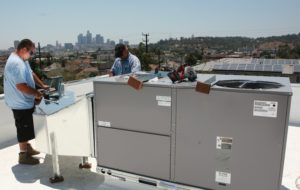HVAC Pump on the Fritz? Check for These Common Issues
Use This List to Assess Your Commercial HVAC Pump

HVAC pumps are an important mainstay of your overall commercial heating and cooling system. They’re working continuously to send liquid through your other equipment connected to them, including boilers, water towers and more. Most commonly a centrifugal or booster pump, unfortunately these can break or fail. Here are some possible reasons.
A Faulty Seal
With any pump maintaining a constant flow of liquid, leakage or seal breakdown can sometimes happen. Excessive heat or caustic chemical exposure is often to blame for damaging the pump face, resulting in leaks. However, the solution is straightforward.
You must ensure that each seal chamber has plenty of lubrication to prevent dryness and subsequent cracking. This is a standard maintenance task for HVAC specialists, and one you should not ignore. Set screws also can become loose over time, so it’s critically important to check those at the time of inspection as well.
Pump Shafts in Poor Condition
As you might imagine, a pump shaft in poor condition has long-range consequences to your entire HVAC system. Without maintenance, breakage and replacement is inevitable. The pump shaft can even shatter after a long period of decay. The solution? Check your belt drive system and all pulleys for indications of system fatigue. Belt tension gauges should be used when installing new ones. Fans and fan clutches should also be assessed, as damaged equipment can in turn break the pump shaft.
Bubble Buildup: Cavitation
Buildup of low-pressure bubbles within the pump liquid, also known as cavitation, can occur. Unfortunately, this phenomenon can create serious problems for your pump and the commercial HVAC system overall, including bearing damage and seal breakage. Fortunately, your commercial HVAC technician can address this issue by increasing the overall NPSH (Net Positive Suction Head) for the pump’s suction side.
The Wrong Size Pump
A poorly sized pump will not only cost you more money in utility bills, but also start up and shut down more frequently than is efficient. Indoor comfort is compromised, and accelerated damage to the overall system can be expected. It’s very important to make sure your HVAC pump is appropriately sized for not only the square footage of your commercial building but also for the temperature at which you will run it.
Corrosive Build Up
Your pump may have rust or other buildup inside, whether due to a corrupted pressure cap or simply deposits that have built up over time. Either way, your HVAC tech should flush the liquid from the pump to ensure there are no clogs or blockages.
Troubleshooting problems with your HVAC pump should not be difficult. Depending on the issue, there are multiple solutions to get your system running properly again soon. Bottom line? Don’t skip maintenance, or regular inspections. Any minor repairs now mean you’ll avoid having to do a total overhaul later.
Need help with your commercial HVAC system? Call Air-Tro today at (626) 357-3535.
